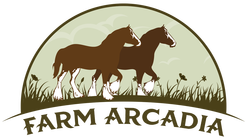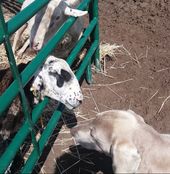 Let me say right off that I am not an expert on sheep and my experience is limited to dairy sheep at this point in time. If you are thinking about getting livestock and considering sheep, especially if your thinking of dairy sheep, hopefully this is a good simple introduction. If I had to pick one specie of livestock to keep, I would be torn between dairy cows and sheep. Goats are great and kids are the best babies. However, there's something about sheep I really like. However, it's about finding the right fit for you.
0 Comments
What are those little metal tags my sheep and goats wear from the time they are a few days old? Those are identification tags that are part of the USDA Scrapie Eradication Program. When I first learned about it, my veterinarian required I have my animals tagged prior to drawing labs that allowed me to sell milk. If this disease has drawn that much interest in monitoring, I was curious to learn more. I am in no way a scrapie expert, but there is a little of what I learned.
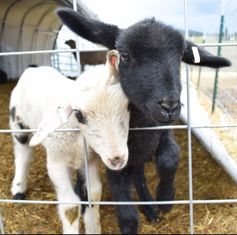 "How can you stand to eat your pets!?" I'm sure most people have asked that or been told that depending on which part they play: the meat raiser or the supermarket consumer. Let me just take a moment to explain one thing - eating my "pets" is actually nicer than eating feedlot beef. My animals are loved, handled gently, and allowed to behave like animals should. They eat healthy food, sunbathe, scratch on trees, and enjoy their lives. They are raised by their moms and kept in herds of their friends. When they are "taken down the road," they have no idea what is happening. They are not hurt first or scared or kept in crowded dirty pen or feed lots. Lights on, lights off. I don't think all animals are afforded the same courtesy, especially poultry, and I think that part is the shame. This does tie in to naming livestock. Livestock are not the same as pets ... not always. Pets are companions and often work on the farm, too. Livestock are producers (or should be). We name all the livestock we plan to keep for longer than meat. Honestly, a lot of the calves end up with nicknames even though they are destined for the freezer - there is Hamburgler, Big Red, Little Red, Chocolate. We've heard of naming them Meatloaf, Chuck, Fillet Mignon (we didn't eat her but sold her - too cute), etc. Our other animals have names that, for the most part, we remember and use when we handle them, and we have a method to this madness. 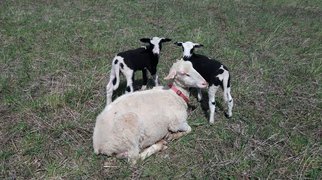 I have had many people ask me about getting a dairy animal - cow, sheep, or goats - for family use or homesteading. I have homesteaded some with dairy animals and think it is definitely a viable consideration on a small scale. From my experience, you need to consider time demands for milking and animal care, annual breeding, feeding, shelter, and handling soiled bedding and manure. This is just a basic introduction - things I usually try to share in the first conversation with those seriously asking.  We keep of herd of Oberhasli goats - both purebred and a few that are a mix. We've had Nubians before and like their long ears, Roman noses, and endless color variations (especially the spots), but prefer the gentler and quieter nature of the Oberhasli in our situation. They are one of the more uncommon breeds, but usually not hard to find. Oberhasli, also know as Swiss Alpine, is descended from a breed in central Switzerland. They are brown bay - red-brown with black trim, which is called chamoisee. There is also a recessive gene for black among the American Oberhaslis. To preserve the breed's traditional color, only black does can be registered. We have had black purebred kids from our gene mix and it's a fun addition. Oberhaslis can be registered whether they are polled or disbudded, meaning they would grown horns if allowed but the horns are destroyed before they grow. We breed for health, milk production, easy kidding, and good mothering. Some fun variations within those goals include some black and polled goats. 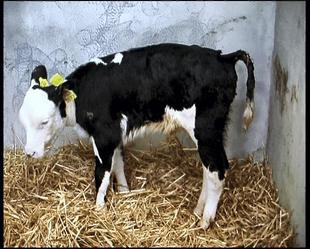 This is not my calf, but shows typical symptoms: tail held up, poopy hind end (more than usual and may be bloody and/or mucousy), and the poor calf looks disinterested in eating or doing anything else - just feeling really sick (poor baby). This is not my calf, but shows typical symptoms: tail held up, poopy hind end (more than usual and may be bloody and/or mucousy), and the poor calf looks disinterested in eating or doing anything else - just feeling really sick (poor baby). I preventatively treat my cattle, sheep, and goats for coccidiosis, also known as bloody scours. This means I add a coccidiostat such as amprolium (CORID is my preferred brand) to their drinking water without them even showing signs of the illness. While I do vaccinate and don't give antibiotics for weight gain or without illness present, my one exception is that I treat preventively for this protozoal infection. It's mortality rate can be high among lambs and kids, and calves are miserable. Amprolium is also very specific in its action. Coccidia (protozoa) are naturally occurring in the environment and adult animal immune systems usually combat them without problem. When there is a upward trend in temperatures and snow starts to melt, there seems to be an explosion of these protozoa in the environment. Younger animals (or weak elderly) do not have as robust of an immune system and can not fend off the protozoal attack. I have seen one of my healthy young bucks show early symptoms, so I view them all as at risk. I feed my dairy girls grain on a regular basis. When they produce high-quality milk for most of the year and have babies every year, they need the extra nutrients and energy. Not only that, they love grain and enjoy the treat.
There are times of the year when their grain ration is low or eliminated. A typical time for this is when I am ending their lactation and need them to stop producing milk. When I start them back on grain, I have to do it gradually or there may be serious complications. |
Mindy HelmsWife to Brandon, mother to Tess and Liam, farmer, entrepreneur, cook & baker, nurse, and accountant who loves to try new things, travel, and work toward greater self-reliance. Archives
March 2020
Categories
All
|
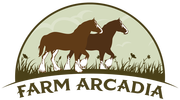
 RSS Feed
RSS Feed
